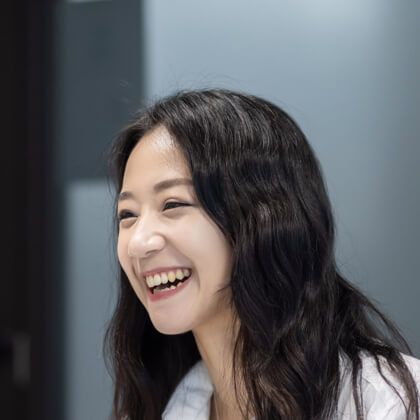Meet the Global LINERs
Planning
Soonhyun Kwon / Product Management / LINE Plus
Soon Hyun joined LINE as a planner in 2018 through an open recruitment drive. In the beginning, his work involved developing the Clova speaker feature for sending and reading LINE messages through voice commands; but, now, he is a “product planner” in charge of Growth Marketing for LINE OpenChat. Today, he talks about his experiences at LINE — both his successes and some failures — along with how he sees the future of the company.
A quick three-line summary
- Soon Hyun is in charge of Growth Management for LINE OpenChat.
- Soon Hyun’s LINE STYLE is ��“Go Brave. No Fear. No Regrets!”
- I didn’t expect even the hippest company would be like this!
About work
Q Please give us a brief introduction to Growth Managment at LINE OpenChat!
LINE OpenChat is a community-based service where users with common interests gather in chat rooms to exchange content via messages. Finding and securing new users is a key part of growing this service, along with retaining current users, of course. We put a lot of effort into finding ways to advertise the service to users who do not know about OpenChat yet and to get them to join. Growth Management is a fairly recent field. Some people define it differently, but, put simply, it is about putting the entire focus of a company on service growth. In a way, it is closely related to regular marketing, however, in growth management, product planners are responsible for creating growth because they can better understand and analyze the behavioral patterns of service users.
Q Since OpenChat is a global service, it’s important to understand the differences between various countries. How do you do this?
Well, for me, I am in charge of Growth for OpenChat in Japan, but I believe there are common characteristics found among users, irrespective of country or culture. For example, in both Korea and Japan, teens and young people in their 20s often use anonymous communication services. However, there are definitely cultural differences between Korea and Japan, too. I had to work extra-hard because I am not good at Japanese. Due to the nature of OpenChat, I believe it is highly important to understand the circumstances and characteristics of the Japanese community, and to this end, I monitor Twitter the most. We constantly monitor how Twitter trends change on the website Meyou, and whether there are any trends that we can develop into OpenChat events. In addition, we also refer to what topics are popular in Japanese community services, such as note, MIXI, and Ameba, and what terms and expressions users enjoy using across the internet. When I go on business trips, I also look for trends in Japanese magazines. Our team frequently travels to Japan, enabling the Japanese team to gain a clearer grasp of the service and allowing us to better understand how Japanese users actually use the service. In addition, we frequently hold focus group interviews in Japan. This process allows us to pay close attention to the real thoughts of Japanese users.
Q Please briefly introduce us to your daily work schedule.
In the morning, I check the service indicators from the previous day and handle the support tasks necessary so collaborating departments can rapidly carry out their tasks. There's a concept in Growth Management called funnel analysis (looking at all the steps users take from entering a website to their final destination), and we check how many users have entered into or left each funnel and how those numbers have changed by day and by week. If an indicator appears to have increased or decreased in a particular part of the funnel, we try to come up with the reason, which we then refer back to the community site. For example, in early April 2020, the indicator rose a lot, particularly for users in their teens and 20s. By monitoring Twitter, we found that the closure of schools caused by COVID-19 increased the use of OpenChat by students. In the afternoon, I prepare draft plans for the work that I am in charge of and hold video conferences with operations or the marketing department in Japan, and exchange draft plans and feedback from each department. Sometimes we discuss new ideas, too. When the marketing department in Japan offers information about the characteristics of users in Japan, that’s often quite helpful; however, if we see some characteristics that we believe applies to all users, not just to Japanese users, we look to persuade our counterparts as well.
Q What was your most memorable moment at work?
It was fun to work on seeding during the preparation stage for OpenChat’s launch. Seeding is, to put it simply, the process of planting early users. Before unveiling the service to the general public, we encouraged small influencers to use OpenChat, so it would look stable and already in use. We contacted about 5,000 influencers, and were able to get 300 of them to use the service early on. By examining the way those early users used the service, I was able to identify behavioral patterns that I hadn’t expected. I believe that those 300 people were a great help to growing the service and played a critical role in increasing the popularity of OpenChat.

Challenges and failures
Q I suppose not all of your experiences have been pleasant. Please tell us about a failure you experienced.
Failure for someone in my position means far fewer users joining a service or project than we expected. One example was our plan for university clubs in Japan to use OpenChat for their new member recruiting. In Japan, university clubs are more important for student identity than in Korea, and, because people in Japan are reluctant about disclosing personal information, they tend to be cautious when recruiting new members. So, Japanese university clubs usually use Twitter to recruit new members, with those students who are accepted getting notified about the LINE ID of the club so they can join. For this reason, I thought OpenChat could replace Twitter, and in November 2019, I began trying to encourage the use OpenChat in that way. However, the outcome was just over 10% of the KPI. I believe that failure was caused by poor timing of the event and a falling participation rate due to extensive subjects. Based on this painful experience, I am putting more careful thought into the next event. It hurts to fail, but when I apply the lessons I learned from a failure to my next project and achieve a good outcome, it feels even more rewarding.
What do you need for success?
Q What kinds of competencies do you believe you need to perform your work well?
There are three things that I consider important: being interested in the service, being interested in users, and keeping an open mind about failure. First of all, interest in the service is the most important thing in a broad sense of planning itself. Since the LINE messenger is our main service, you need to be interested in messengers. You need to think about and explore this kind of service on your own, even if no one asks you to do so. I am very interested in video services like YouTube and Twitch, so I spend a lot of time using them. That naturally means I use them a lot and think about their strengths and weaknesses. The next thing is being interested in our users. It's almost too much of a cliché to mention, but it’s also very true, you need to be really fascinated with everything about users. A planner uses a service from the perspective of a creator, but I believe we need to look at things from the viewpoint of users, who have no idea about the service. When new features are added to the service, I usually have my friends try using them and get their feedback, rather than getting feedback from LINERs. It is amazing to see how regular users can understand and use services in a completely different way from what I thought. The last key is keeping open minded about failure. I have experienced many minor failures while doing my job. Since the goal is to develop a service in a variety of ways, it is hard to predict the outcome, and I sometimes face new experiences during this process. Looking back, I believe it is ideal to have an open mind that can accept failure, since all challenges involve attempting new things. One of the LINE STYLE values is “Go Brave. No Fear. No Regrets!” which I doubted at first, but now I like the unique culture of LINE that offers support even if I fail while taking on a daring challenge, as long as I learn from it.

Special experiences at LINE
Q Have you had any particular surprises or memorable moments at LINE?
My first job ever was working for LINE. Before I joined the company, I thought, no matter how “hip” it is, it will basically be just like any other company. It was depressing to think that I’d have to grow older and get promoted before people listened to me. But, in fact, I was impressed to see that even the opinions of new employees like myself were accepted and people talked things out together while attending meetings and carrying out their tasks. The culture of discussing things, regardless of who someone is, as long as their logic is clear, is well established here. It was very impressive how Euivin (CTO Euivin Park) explained the entire project roadmap of LINE's numerous services to all the employees and she synchronized with the LINERS in charge of each each service. If you are just engaged in the practical, day-to-day affairs of a particular service, you can easily end up not knowing about the rest of the company, so it was interesting and refreshing to understand the overall nature of our services and the markets where we operate.
Q Is there anything unique about the culture of LINE that you’d like people to know?
While going through the COVID-19 pandemic, I came to learn about our many welfare benefits. For instance, developers and designers need lots of good equipment for their work, and as people increasingly had to work from home, I was impressed by how LINE was so ready to send that equipment to their homes, or send them laptops for their children to do their online classes as the new school year began. (even if that one isn’t applicable in my case)
Q You went to Google I/O through LINE’s in-house conference support. Care to discuss that here?
I signed up for Google I/O and was lucky to win a spot, so was able to attend Google I/O with company support. There were project sessions on a wide variety of topics, including payment systems, autonomous driving and Google Assistant, and each session was presented by working-level staff in charge of each task. The most impressive session was one where their ideation methodology was shared, and I still use that method with my team members. [Soon Hyun's Review of Google I/O 2019] https://engineering.linecorp.com/ko/blog/google-io-2019-thinking-in-5g-workshop-review/
Wrap-up
Q Do you have any goals you really want to achieve?
What comes to my mind at the moment is that I really want to reach my KPI targets! There is a number of active OpenChat users set as our KPI target, and, having worked on this project since the seeding phase, if we can hit that number it will feel really rewarding. I am also looking forward to this achievement because I believe that the service should be able to run well on its own after acquiring enough users.




